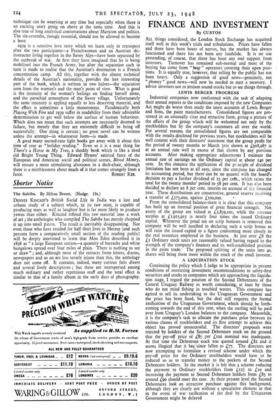FINANCE AND INVESTMENT
By CUSTOS
Au, things considered, the London Stock Exchange has acquitted itself well in this week's trials and tribulations. Prices have fallen and there have been bouts of nerves, but the market has always functioned and there has not been any landslide. It is no use pretending, of course, that there has been any real support from investors. Turnover has remained sub-normal and most of the buying has come from " bea4r " operators covering their open posi- tions. It is equally true, hoviever, that selling by the public has not been heavy. Only a suggestion of good news—genuinely, not " phoney " good news—will now be needed to start a recovery. I advise investors not to jettison sound stocks but to see things through.
LEWIS BERGER PROGRESS
Industrial companies now confronted with the task of adapting their annual reports to the conditions imposed by the new Companies Act might do worse than study the latest accounts of Lewis Berger and Sons, the paint manufacturers. Consolidated figures are pre- sented in an unusually cleat and attractive form, giving a picture of the affairs of the group which-,will be welcomed not only by the stockholders but by the company's customers all over the world. For several reasons the consolidated figures are not comparable with the results disclosed for previous years, but stockholders will be well content with their directors' statement that the group profit for the period of twenty months to-March 3ist shown at k918,087 is at an annual rate well in excess of that shown by any previous accounts. After making appropriate adjustments I estimate the annual rate of earnings on the Ordinary capital at about 140 per cent. In this instance the application of the principle of dividend limitation has not been at all easy, since the company has changed its accounting period, but there can be no quarrel with the board's decision to pay a further dividend of 25 per ceftt., which raises the total for the twenty months' period to 58 per cent. It has also been decided to declare an 8 per cent, interim on account of ti-,a financial year. These distributions are conservative, general reserve receiving
a transfer of £575,000, against £100,000. • From the consolidated balance-sheet it is clear that this company has built up an internal position of great financial strength. Net assets of the group are valued at £3,859,101, while the revenue surplus at £1,915,915 is nearly four times the issued Ordinary capital. Whenever the penal tax on scrip bonuses is removed this company will be well justified in declaring such a scrip bonus as will raise the issued capital to a figure conforming more closely to the real resources employed in the business. At just over £8 the Li Ordinary stock units are reasonably valued having regard to the strength of the company's finances and its well-established position in the paint trade: The proposed splitting of the units into 4s. shares will bring them more within the reach of the small investor.
A LIQUIDATION STOCK
Continuing the policy which I judge to be appropriate in present conditions of restricting investment recommendations to safety-first securities and stocks in companies which are approaching the liquida- tion stage, I regard the position of the Second Debentures of the Central Uruguay Railway as worth considering, at least by those who do not mind fishing in troubled waters. This company has agreed to sell its undertaking to the Uruguayan Government and the price has been fixed, but the deal still requires the formal ratification of the Uruguayan Government, which should be forth- coming towards the end of this year, when the sterling will be paid over from Uruguay's London balances to the company. Meanwhile, it is the company's task to allocate the purchase price between its various classes of stockholders and its first attempt to achieve this object has proved unsuccessful. The directors' proposals were rejected by holders of the Second Debenture stock on the ground that the pay-off price of -0152....per km nominal was inadequate. At that time the Debenturfe stock was quoted around £82 and it seems illogical that it has ;since fallen to £77. The directors are now attempting to formulate a revised scheme under which the pay-off price for the Ordinary stockholders would have to be reduced so as to transfer money to the pockets of the Second Debenture holders. In the market it is felt that a scheme reducing the payment to Ordinary stockholders from £124 to £to and increasing the payment to Second Debenture holders from £85 to around k90 should meet the case. At their present level the Second Debentures look an attractive purchase against this background, although they are clearly not without a speculative element in that in the event of war • ratification of the deal by the Uruguayan Government might be delayed


































 Previous page
Previous page